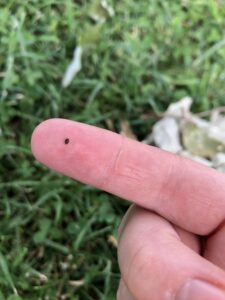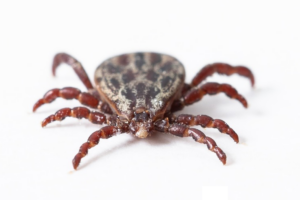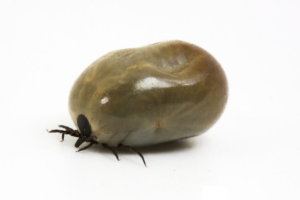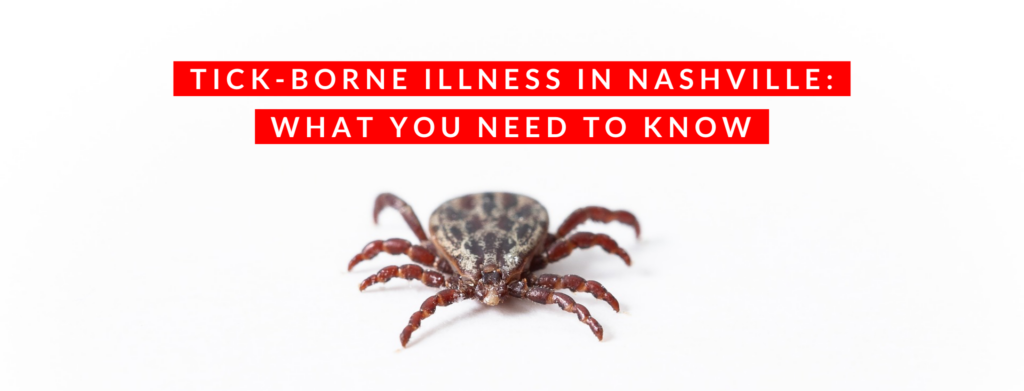Tick-Borne Illness in Nashville: What You Need to Know
A mild winter in Nashville brought ticks out earlier than usual this year. We saw our first tick-borne illness in our West Nashville urgent care clinic in early March which is unusually early – typically ticks don’t become active until after Easter. Because we live in a city with many heavily wooded areas and a high incidence of ticks, we see a fair amount of tick bites during the summer months.
Ticks in Nashville
Typically tick bites are not reason for concern and can be treated at home by removing the tick, cleaning the area and watching for any signs of infection of the site. However, when the tick bite is accompanied by a fever, headache or rash, an evaluation by a medical profession is advised. A recent CDC study showed a doubling in the number of tick borne diseases in the US from 2004 to 2016, so it is important to know how to identify the signs and symptoms of tick borne illness in your area to protect both you and your loved ones.
Tick-borne Illnesses Found In Nashville, TN
Nashville is home to as many as 15 different tick breeds, but the most common are the deer tick, the lonestar tick, and the dog tick. Ticks are most often found in heavily wooded areas and tall grasses, and most often crawl up from the ground rather than drop from branches. Young ticks are very small – about the size of a poppy seed, while adult ticks can be around the size of an apple seed. Very small ticks – known as seed ticks – usually don’t carry diseases.



Rocky Mountain Spotted Fever
The most concerning illness from ticks in Nashville is Rocky Mountain Spotted Fever. While its name may sound fake, RMSF is a serious bacterial infection that must be treated with specific antibiotics (doxycycline)
RMSF is carried by the American dog tick, the Rocky Mountain wood tick, and the brown dog tick. These ticks carry a bacteria known as Rickettsia rickettsii which they transmit through a bite.
RMSF can be difficult to diagnose. Symptoms may not materialize until nearly two weeks after infection. The most common symptoms are fever, headache, joint pain, fatigue, abdominal pain and a rash (although it is often absent). Often the symptoms are similar to the flu. Many people do not notice a tick bite, so if you experience these symptoms after spending time outdoors in Nashville, it is best to be evaluated by a medical professional.
If left untreated, RMSF can cause serious, long-term damage to internal organs such as your heart or kidneys. It can result in neurological damage such as hearing loss, weakness and numbness of extremities, and in the most severe cases, bleeding in the brain or death.
Why haven’t I ever heard about RMSF?
If you are new to Tennessee, you may not have heard of RMSF because it most often occurs in only five states (ironically, none of which are in the Rocky Mountains…): Tennessee, North Carolina, Oklahoma, Missouri and Arkansas.
Lyme disease
Lyme disease is incredibly rare in Nashville. While we do occasionally see patients with Lyme disease, most of the diagnoses we make are in patients who have recently traveled to the north or west where they got the tick bite.
Symptoms of Lyme disease include headache, body pain and fever. If you experience an oval-shaped, bullseye rash around a tick bite, seek medical attention for further evaluation.
Alpha-Gal – “The Red Meat Allergy”
Some Lone Star ticks can transfer a sugar molecule known as alpha-gal which can cause a red meat allergy. The allergy usually does not present until after the person is infected. You likely won’t know that you have been infected until after you experience the allergy. Alpha-gal allergic reaction symptoms include hives, swelling, wheezing or shortness of breath, runny nose, abdominal pain, diarrhea, vomiting, headaches, and even anaphylaxis, which is a deadly allergic reaction.
Southern Tick Associated Rash Illness
A rash similar to the bulls-eye shaped Lyme disease rash occurs occasionally after some Lone-stone tick bites, and may be accompanied by fatigue, fever, headache, muscle and joint pains. This rash is known as Southern Tick Associated Rash Illness or STARI and occurs within 7 days of the tick bite. The cause of STARI is unknown, however because it so closely resembles Lyme disease, it is often treated with antibiotics as a precaution.
Erlichiosis
Ehrlichiosis is another less common tick-borne bacterial infection that we occasionally see in our West Nashville urgent care clinic. It will often cause fever, chills, headache, muscle aches, and occasionally upset stomach. Doxycycline is the treatment of choice for adults and children of all ages with ehrlichiosis.
Here are some tips for avoiding tick bites while enjoy our beautiful Nashville hiking trails:
- Stay on hiking trails and cleared paths when walking in heavily wooded areas.
- Wear light-colored clothing to allow you to better see ticks that might crawl on your clothing.
- Wear long-sleeved shirts and tuck your pant legs into your socks so that ticks cannot crawl up the inside of your pant legs.
- Apply .5% permethrin (Nix) to clothing to prevent ticks from attaching.
- Use a bug spray with 20% or more DEET (speak to your pediatrician for the right concentration for your kids) or if you wish to avoid DEET, you can use Avon’s Skin So Soft or oil of lemon eucalyptus, though these are not as effective as DEET.
- Check for & remove ticks on your body and clothing after returning from wooded, brushy, or tall, grassy areas.
- Be sure to look carefully in areas of the body where hair is present, since it may make it difficult to see the ticks.
- Shower after being in an area with ticks, and promptly put clothes in a dryer on high heat to kill ticks.
- Speak to your vet about tick prevention products for your pets.
- If you get a rash or a fever, let your provider know if you may have been exposed to ticks, even if you don’t remember having a tick bite.
How to Remove a Tick
Remove ticks as soon as possible with tweezers by firmly grabbing the entire body and pulling straight up. Monitor the site for infection or rash, and be on alert for any signs of illness such as fever, headache, nausea or stomach cramps.
Treatment for Tick-Borne Illnesses in Nashville
At Complete Urgent Care we can do blood testing for tick-borne illnesses, if indicated. Because it takes 5-7 business days to get the lab results back for tick-borne illnesses, treatment is often based on clinical indicators and started if clinical signs point to a tick-borne illness.
About Complete Urgent Care
We have two convenient Nashville walk in clinics to care for you when and where you need care. Our walk in clinic doors are open every day to our Nashville community. Our West Nashville Urgent Care is located at 6746 Charlotte Pike in the Nashville West Shopping Center by the old log cabin and Costco. Our newest walk in clinic location is a Hendersonville Urgent Care Clinic located at 166 E Main Street. We offer urgent and walk in care 10 hours a day, 7 days a week. With our online check in, you can select a time that works for you and get seen on your schedule. Our Nashville urgent care serves patients all across Nashville – from Bellevue to Bordeaux and from downtown Nashville to Kingston Springs – we are Nashville’s partner in complete health.
Nashville Area Urgent Care Clinics
6749 Charlotte Pike, Nashville, TN 37209
629.203.7858
9am – 7pm, 7 days a week
166 E Main Street, Hendersonville, TN 37075
615.991.2855
9am – 7pm, 7 days a week

